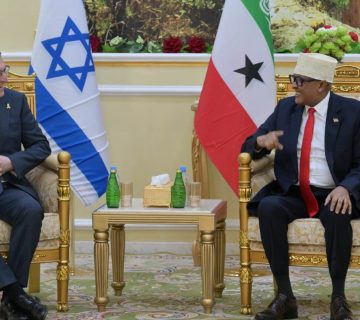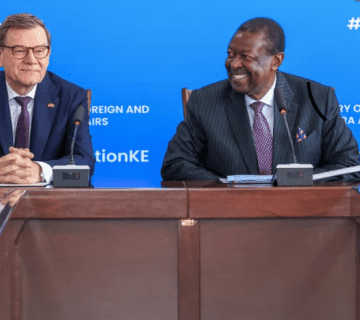On July 9, 2018, Ethiopia’s Prime Minister Abiy Ahmed, and Eritrea’s President Isaias Afwerki signed a peace agreement, effectively ending the state of war between the two countries which had existed since 1998 when a border conflict broke out around the town of Badme, killing 100,000 people. The Ethiopian-Eritrean war lasted until the year 2000 when the Algiers Peace Accord was signed. A neutral Boundary Commission, established under the Algiers Accord, determined that Ethiopia was to give up the terrain it conquered during the two-year war. Ethiopia refused, and what followed was ‘cold war’ that influenced peace and stability in the wider Horn of Africa, with both countries upholding the ‘enemy of my enemy is my friend’ principle and fighting several proxy wars.
Since the signing of the peace agreement in July 2018, positive diplomatic moves have taken place in the Horn of Africa. Ethiopia, Eritrea, and Somalia have signed a tripartite agreement, aiming for closer collaboration in the areas of security, economy, politics, and culture. All three countries pledged in the tripartite agreement to work closely together to increase peace and security in the Horn of Africa. Following the tripartite agreement, Eritrea and Djibouti have agreed to normalize ties after a border spat led to brief military clashes. Ethiopia has reopened its embassy in Asmara, the capital of Eritrea, and both countries have pulled back their troops from the border, which they re-opened in September 2018. This unprecedented wave of positive diplomacy is met with great enthusiasm in the region and on the international stage. However, countries in the region should remain wary of spoilers and spoiler events that could disrupt recent positivity.
Stephen John Stedman, prominent scholar at the International Peace Institute and author of the article ‘Spoiler Problems in Peace Processes’, has defined spoilers as “leaders and parties who believe that peace emerging from negotiations threatens their power, worldview, and interests, and use violence to undermine attempts to achieve it.” By signing an agreement, leaders put themselves at risk from adversaries or disgruntled supporters who see peace as a betrayal of key values. Spoiler events are events that might, purposefully or inadvertently, disrupt peace and stability. For the Horn of Africa, the following are some possible spoilers and events that might have a negative effect on the probability of peace in the region.
The first might come from countries who benefited from the status-quo. Djibouti has acquired over 90 per cent of Ethiopia’s port traffic over the last two decades due to the anonymity between Ethiopia and Eritrea. Ethiopia pays USD 1.5 billion annually for Djibouti’s port services. However, trade between Djibouti and Ethiopia will most likely remain solid due to the Ethio-Djibouti railway which was completed on January 1, 2018. The railway ensures a steady logistical connection between the two countries. Additionally, Djibouti’s port services are far superior to those of other countries in the region.
The second might come from disgruntled individuals and groups who oppose peace in the region for ideological reasons. The original border conflict took place around the Tigrayan town of Badme. Disgruntled Tigrayans, who still hold significant positions of power in both the political and military leadership, might oppose peace efforts between Ethiopia and Eritrea because they don’t want to hand-over the Badme region. Last week, in September 2018, ethnic clashes on the outskirts of Addis Abeba in Burayu have left several dead and hundreds displaced. It is still unknown who the perpetrators are and why they attacked in the first place, but what has become visible over the last week is that deep ethnic cleavages still exist within Ethiopia and that these pose a risk to Ethiopia’s recent stability.
Third, there is the possibility of Abiy Ahmed being killed or removed from power. On June 23, 2018, a grenade exploded at a rally where Abiy was just wrapping up a speech, forcing him to hurry off the stage under the protection of his security detail. In 2020, Ethiopian elections will determine of Abiy can stay a second term. Despite the fact that he is very popular in Ethiopia, there is always a possibility that he is removed from power, especially because he himself has pledged that the elections would be fair and open. His reform drive is sure to draw opposition from regime-hardliners, which might reverse his policies if they win the next elections in 2020. A political science student from Ginchi, the town in Ethiopia where the 2015 protests started against the government, said in an interview with Al Jazeera, “We consider him just a painkiller and not the cure to what actually ails Ethiopia. The future of Ethiopia depends on the next elections and whether they are free and fair.” If Abiy dies or is removed from power, what then would happen to the positive changes he has brought to the region?
Fourth, over the years Eritrea has been accused by Somalia of funding and supporting al Shabab, an Islamist insurgency that has wreaked havoc in Somalia and the wider region. Eritrea has always denied these allegations. In 2009, the United Nations Monitoring Group on Somalia and Eritrea imposed an arms embargo on Eritrea for providing finance and weapons to al Shabab. In 2012, that same monitoring group found that support had ‘evaporated’. If peace is to succeed in the region, there must be a clear break with the past from both Somalia and Eritrea with regards to anonymity towards each other. Instead, they should jointly address issues of security and terrorism in the Horn.
Finally, President Afwerki still maintains a large standing army, and there have been no developments yet with regards to the forced and indefinite conscription in Eritrea. The Economist suggested in an article on May 7, 2018, that Afwerki historically has used the threat of Ethiopian, Somali, and Sudanese intervention in Eritrea’s internal affairs as an excuse to uphold forced and indefinite conscription and thus keep the population under control.
The recent wave of positive diplomacy provides an opportunity for increased peace and stability in the Horn of Africa. Increased social, political, cultural, and economic ties will create stronger partnerships, enhancing the region’s attractiveness to investment, trade, and cooperation. There are some risks to the new-found peace, but with adequate risk-management strategies, these risks can be minimized to ensure that a new and more peaceful situation in the Horn of Africa will become the status-quo.
Jules Swinkels is a Visiting Research Fellow at the HORN Institute



